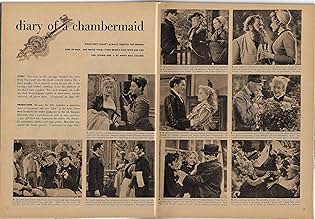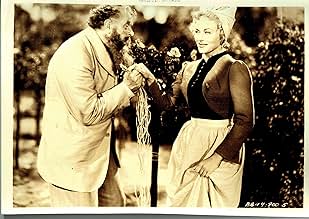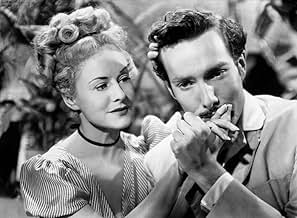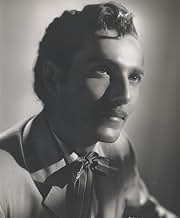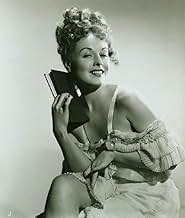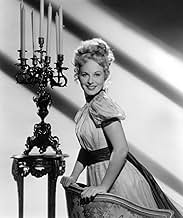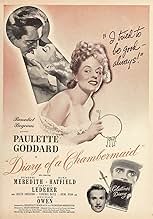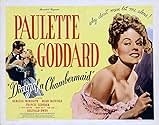PUNTUACIÓN EN IMDb
6,5/10
1,6 mil
TU PUNTUACIÓN
Añade un argumento en tu idiomaA chambermaid plots to climb the social ladder by marrying a wealthy man.A chambermaid plots to climb the social ladder by marrying a wealthy man.A chambermaid plots to climb the social ladder by marrying a wealthy man.
- Dirección
- Guión
- Reparto principal
- Premios
- 1 premio en total
Edward Astran
- Townsman
- (sin acreditar)
Arthur Berkeley
- Townsman
- (sin acreditar)
Chet Brandenburg
- Townsman
- (sin acreditar)
Egon Brecher
- The Postman
- (sin acreditar)
Jane Crowley
- Townswoman
- (sin acreditar)
Sumner Getchell
- Pierre
- (sin acreditar)
Jack Perry
- Townsman
- (sin acreditar)
Joe Ploski
- Townsman
- (sin acreditar)
Reseñas destacadas
I cannot pretend to explain all the allusions and metaphors Renoir intended to convey with this impressionistic comedy. Paulette Goddard, as the main character, is magnificent. She conveys her feelings and thoughts through her diary, but in a manner that is always blurry and full of confusion. And speaking of confusion, Hurd Hatfield is on hand as the scion of the odd home. Burgess Meredith, Francis Lederer, and Irene Ryan all add terrific seriocomic support in their roles.
Be prepared to experience many conflicting feelings while viewing this film.
Be prepared to experience many conflicting feelings while viewing this film.
A double-bill of two films transmuting Octave Mirbeau's source novel LE JOURNAL D'UNE FEMME DE CHAMBRE onto the celluloid, made by two cinematic titans: Jean Renoir and Luis Buñuel, 18 years apart.
Renoir's version is made in 1946 during his Hollywood spell, starring Paulette Goddard as our heroine Celestine, a Parisian girl arrives in the rural Lanlaire mansion to work as the chambermaid in 1885, barely alighting from the train, Celestine has already been rebuffed by the haughty valet Joseph (an excellently surly Lederer), and confides to the also newly arrived scullery maid Louise (a mousy and dowdy Irene Ryan) that she will do whatever in her power to advancing her social position and firmly proclaims that love is absolutely off limits, and the film uses the literal diary- writing sequences as a recurrent motif to trace Celestine's inner thoughts.
The objects of her tease are Captain Lanlaire (Owen), the patriarch who has relinquished his monetary sovereignty to his wife (Judith Anderson, emanating a tangy air of gentility and callousness); and Captain Mauger (a comical Burgess Meredith, who also pens the screenplay off his own bat), the Lanlaire's goofy neighbor who has a florae-wolfing proclivity and is perennially at loggerheads with the former on grounds of the discrepancy in their political slants, both are caricatured as lecherous old geezers with the death of a pet squirrel prefiguring the less jaunty denouement.
In Renoir's book, the story has a central belle-époque sickly romantic sophistication to sabotage Celestine's materialistic pursuit, here her love interest is George (Hurd Hatfield), the infirm son of the Lanlaire family, a defeatist borne out of upper-crust comfort and has no self-assurance to hazard a courtship to the one he hankers after. Only when Joseph, a proletariat like Celestine, turns murderous and betrays his rapacious nature, and foists a hapless Celestine into going away with him, is George spurred into action, but he is physically no match of Joseph, only with the succor from the plebeian mob on the Bastille Day, Celestine is whisked out of harm's way, the entire process is shrouded by a jocose and melodramatic state of exigency and Renoir makes ascertain that its impact is wholesome and wonderfully eye-pleasing.
In paralleled with Buñuel's interpretation of the story, Renoir has his innate affinity towards the aristocracy (however ludicrous and enfeebled are those peopled) and its paraphernalia, the story is less lurid and occasionally gets off on a comedic bent through Goddard's vibrant performance juggling between a social-climber and a damsel-in-distress.
The same adjective "comedic", "vibrant" certainly doesn't pertain to Buñuel's version, here the time-line has been relocated to the mid-1930s, Celestine (played by Jeanne Moreau with toothsome reticence and ambivalence) more often than not, keeps her own counsel, we don't even once see her writing on the titular diary, she works for Mr. and Mrs Monteil (Piccoli and Lugagne), who are childless but live with Madame's father Mr. Rabour (Ozenne, decorous in his condescending aloofness), an aristo secretly revels in boots fetish in spite of his dotage. Here the bourgeois combo is composed of a frigid and niggardly wife, a sexed-up and henpecked husband (Mr. Piccoli makes for a particularly farcical womanizer, armed with the same pick-up line), a seemingly genteel but kinky father, and Captain Mauger (Ivernel), here is less cartoonish but no less uppity, objectionable and erratic; whereas Joseph (Géret), is a rightist, anti-Semitic groom whose perversion is to a great extent much more obscene (rape, mutilation and pedophilia are not for those fainted hearts).
Amongst those anathemas, Celestine must put on her poker face, or sometimes even a bored face to be pliant (she even acquiesces to be called as Marie which Goddard thinks better of in Renoir's movie), she is apparently stand-offish but covertly rebellious, and when a heinous crime occurs (a Red Riding Hood tale garnished with snails), she instinctively decides to seek justice and tries insinuating her way into a confession from the suspect through her corporeal submission, only the perpetrator is not a dolt either, unlike Renoir's Joseph, he knows what is at stakes and knows when to jettison his prey and start anew, that is a quite disturbing finale if one is not familiar with an ending where a murderer gets away with his grisly crime. But Buñuel cunningly precedes the ending with a close-up of a contemplating Celestine, after she finally earns her breakfast-in-bed privilege, it could suggest that what followed is derived from her fantasy, which can dodge the bullet if there must be.
Brandishing his implacable anti-bourgeoisie flag, Buñuel thoughtfully blunts his surrealistic abandon to give more room for dramaturgy and logical equilibrium, which commendably conjures up an astringent satire laying into the depravity and inhumanity of the privileged but also doesn't mince words in asserting that it doesn't live and die with them, original sin is immanent, one just cannot be too watchful.
Last but definitely not the least, R.I.P. the one and only Ms. Moreau, who just passed away at the age of 89, and in this film she is a formidable heroine, brave, sultry and immune to all the mushy sentiments, whose fierce, inscrutable look is more than a reflection of her temperaments, but a riveting affidavit of a bygone era's defining feature.
Renoir's version is made in 1946 during his Hollywood spell, starring Paulette Goddard as our heroine Celestine, a Parisian girl arrives in the rural Lanlaire mansion to work as the chambermaid in 1885, barely alighting from the train, Celestine has already been rebuffed by the haughty valet Joseph (an excellently surly Lederer), and confides to the also newly arrived scullery maid Louise (a mousy and dowdy Irene Ryan) that she will do whatever in her power to advancing her social position and firmly proclaims that love is absolutely off limits, and the film uses the literal diary- writing sequences as a recurrent motif to trace Celestine's inner thoughts.
The objects of her tease are Captain Lanlaire (Owen), the patriarch who has relinquished his monetary sovereignty to his wife (Judith Anderson, emanating a tangy air of gentility and callousness); and Captain Mauger (a comical Burgess Meredith, who also pens the screenplay off his own bat), the Lanlaire's goofy neighbor who has a florae-wolfing proclivity and is perennially at loggerheads with the former on grounds of the discrepancy in their political slants, both are caricatured as lecherous old geezers with the death of a pet squirrel prefiguring the less jaunty denouement.
In Renoir's book, the story has a central belle-époque sickly romantic sophistication to sabotage Celestine's materialistic pursuit, here her love interest is George (Hurd Hatfield), the infirm son of the Lanlaire family, a defeatist borne out of upper-crust comfort and has no self-assurance to hazard a courtship to the one he hankers after. Only when Joseph, a proletariat like Celestine, turns murderous and betrays his rapacious nature, and foists a hapless Celestine into going away with him, is George spurred into action, but he is physically no match of Joseph, only with the succor from the plebeian mob on the Bastille Day, Celestine is whisked out of harm's way, the entire process is shrouded by a jocose and melodramatic state of exigency and Renoir makes ascertain that its impact is wholesome and wonderfully eye-pleasing.
In paralleled with Buñuel's interpretation of the story, Renoir has his innate affinity towards the aristocracy (however ludicrous and enfeebled are those peopled) and its paraphernalia, the story is less lurid and occasionally gets off on a comedic bent through Goddard's vibrant performance juggling between a social-climber and a damsel-in-distress.
The same adjective "comedic", "vibrant" certainly doesn't pertain to Buñuel's version, here the time-line has been relocated to the mid-1930s, Celestine (played by Jeanne Moreau with toothsome reticence and ambivalence) more often than not, keeps her own counsel, we don't even once see her writing on the titular diary, she works for Mr. and Mrs Monteil (Piccoli and Lugagne), who are childless but live with Madame's father Mr. Rabour (Ozenne, decorous in his condescending aloofness), an aristo secretly revels in boots fetish in spite of his dotage. Here the bourgeois combo is composed of a frigid and niggardly wife, a sexed-up and henpecked husband (Mr. Piccoli makes for a particularly farcical womanizer, armed with the same pick-up line), a seemingly genteel but kinky father, and Captain Mauger (Ivernel), here is less cartoonish but no less uppity, objectionable and erratic; whereas Joseph (Géret), is a rightist, anti-Semitic groom whose perversion is to a great extent much more obscene (rape, mutilation and pedophilia are not for those fainted hearts).
Amongst those anathemas, Celestine must put on her poker face, or sometimes even a bored face to be pliant (she even acquiesces to be called as Marie which Goddard thinks better of in Renoir's movie), she is apparently stand-offish but covertly rebellious, and when a heinous crime occurs (a Red Riding Hood tale garnished with snails), she instinctively decides to seek justice and tries insinuating her way into a confession from the suspect through her corporeal submission, only the perpetrator is not a dolt either, unlike Renoir's Joseph, he knows what is at stakes and knows when to jettison his prey and start anew, that is a quite disturbing finale if one is not familiar with an ending where a murderer gets away with his grisly crime. But Buñuel cunningly precedes the ending with a close-up of a contemplating Celestine, after she finally earns her breakfast-in-bed privilege, it could suggest that what followed is derived from her fantasy, which can dodge the bullet if there must be.
Brandishing his implacable anti-bourgeoisie flag, Buñuel thoughtfully blunts his surrealistic abandon to give more room for dramaturgy and logical equilibrium, which commendably conjures up an astringent satire laying into the depravity and inhumanity of the privileged but also doesn't mince words in asserting that it doesn't live and die with them, original sin is immanent, one just cannot be too watchful.
Last but definitely not the least, R.I.P. the one and only Ms. Moreau, who just passed away at the age of 89, and in this film she is a formidable heroine, brave, sultry and immune to all the mushy sentiments, whose fierce, inscrutable look is more than a reflection of her temperaments, but a riveting affidavit of a bygone era's defining feature.
The Diary of a Chambermaid (1946) was directed by the great Jean Renoir. This is an U.S. film, although the action was set in France, and directed by a French director.
The movie is set in rural France in 1885. As the title suggests, a new chambermaid has arrived at a mansion of an eccentric couple. (Actually, almost everyone in the movie is eccentric to a greater or lesser degree.)
The person who's not eccentric, but totally evil, is the valet, Joseph. Francis Lederer portrayed Joseph, who is evil to the core. He looks like the villain that he is. (Actually, in one film. he played Count Dracula).
The reason to see is film is to watch Paulette Goddard at work. She was the classic Hollywood beauty of her time. And, 70 years later, she is still a classic Hollywood beauty. Better than that, she could act! Goddard plays Célestine, the chambermaid, whose only path out of lower-class drudgery is to marry a rich man. How this plays out is the plot of the film.
Renoir was possibly the greatest film director of the 20th Century. However, this movie is one of his minor films. Renoir does crowd scenes well, but he can't take his eyes off Goddard, and neither can we.
This movie has an anemic IMDB rating of 6.7. It's not a great film, but I think it's better than that. We saw it on DVD, and it worked well enough. Be sure to see it if you're a Renoir fan or a Goddard fan. Otherwise, I'd suggest Buñuel's 1964 version, with Jeanne Moreau.
The movie is set in rural France in 1885. As the title suggests, a new chambermaid has arrived at a mansion of an eccentric couple. (Actually, almost everyone in the movie is eccentric to a greater or lesser degree.)
The person who's not eccentric, but totally evil, is the valet, Joseph. Francis Lederer portrayed Joseph, who is evil to the core. He looks like the villain that he is. (Actually, in one film. he played Count Dracula).
The reason to see is film is to watch Paulette Goddard at work. She was the classic Hollywood beauty of her time. And, 70 years later, she is still a classic Hollywood beauty. Better than that, she could act! Goddard plays Célestine, the chambermaid, whose only path out of lower-class drudgery is to marry a rich man. How this plays out is the plot of the film.
Renoir was possibly the greatest film director of the 20th Century. However, this movie is one of his minor films. Renoir does crowd scenes well, but he can't take his eyes off Goddard, and neither can we.
This movie has an anemic IMDB rating of 6.7. It's not a great film, but I think it's better than that. We saw it on DVD, and it worked well enough. Be sure to see it if you're a Renoir fan or a Goddard fan. Otherwise, I'd suggest Buñuel's 1964 version, with Jeanne Moreau.
"Life is life. From now on I'm going to fight, and I'm going to fight hard, and I don't care who gets hurt, just so as it's not me."
"Don't be afraid of me. You and I are alike, maybe not in looks, but underneath we are the same."
"How does it feel to be in love?
"Plans can get you into trouble."
"We are not used to kissing in public.
"Where are you going?
"The more I'm beaten, the stronger I get."
"Don't be afraid of me. You and I are alike, maybe not in looks, but underneath we are the same."
"How does it feel to be in love?
- It changes all the time."
"Plans can get you into trouble."
"We are not used to kissing in public.
- Not in public. Are you ashamed? You shouldn't be ashamed of love. You should be proud. Take him in your arms, hold him, kiss him, embrace him!"
"Where are you going?
- Flying to the moon." 😂
"The more I'm beaten, the stronger I get."
This film is not to be confused with the film by the same name which was made in 1964 by the famed director Luis Buñuel. While the theme of a conniving maid who is using her wiles to get ahead is in both and they have the same name, otherwise the films are very dissimilar--mostly because the bizarreness of Buñuel's version is missing. No foot fetishes, no rape, no murder and no antisemitism in the 1946 film! Jean Renoir's vision for the story is light-years different from Buñuel's. Personally, I think both versions have their strengths and both have their flaws, but I think the latter version is a bit better.
Paulette Goddard plays the title role. She is a conniving woman who comes to her new home as a maid in order to marry a rich man. She's mostly interested in the master's son--but the young man is an indifferent suitor at best (Hurd Hatfield). There's also the old and VERY wacky neighbor (Burgess Meredith) and the valet--played in a very creepy manner by Francis Lederer. Who will she get by the end of the film? And, unfortunately, who care? My biggest problem with this film is Goddard. I have long wondered why she got so many plum roles as she was only a fair actress--and here she often overplays her part. Any sort of subtlety is missing from her portrayal--and the role really needed this, as the woman SHOULD have been played like a master manipulator. As far as the direction goes, it wasn't bad--and had the nice look Jean Renoir was noted for in his films. But he probably should have reigned in a few of the more florid portrayals (not just Goddard's)--though Lederer was BRILLIANT and the best thing about the film. Also, Goddard's character was a bit too sympathetic--she should have been much more amoral and manipulative in order to make the movie more enjoyable. Overall, I prefer the 1964 version a bit more--though I think this film could use yet another remake--one that is more subtle and without the weird 'extras' Luis Buñuel put in his film that tended to distract the viewer. Worth seeing but nothing more--and it should have been better. A great script idea that should have been even better--and juicier.
FYI--Burgess Meredith and Paulette Goddard were married while they were making this film. Seeing Meredith wearing so much makeup and playing a very old man was rather funny--as they are almost the same age.
Paulette Goddard plays the title role. She is a conniving woman who comes to her new home as a maid in order to marry a rich man. She's mostly interested in the master's son--but the young man is an indifferent suitor at best (Hurd Hatfield). There's also the old and VERY wacky neighbor (Burgess Meredith) and the valet--played in a very creepy manner by Francis Lederer. Who will she get by the end of the film? And, unfortunately, who care? My biggest problem with this film is Goddard. I have long wondered why she got so many plum roles as she was only a fair actress--and here she often overplays her part. Any sort of subtlety is missing from her portrayal--and the role really needed this, as the woman SHOULD have been played like a master manipulator. As far as the direction goes, it wasn't bad--and had the nice look Jean Renoir was noted for in his films. But he probably should have reigned in a few of the more florid portrayals (not just Goddard's)--though Lederer was BRILLIANT and the best thing about the film. Also, Goddard's character was a bit too sympathetic--she should have been much more amoral and manipulative in order to make the movie more enjoyable. Overall, I prefer the 1964 version a bit more--though I think this film could use yet another remake--one that is more subtle and without the weird 'extras' Luis Buñuel put in his film that tended to distract the viewer. Worth seeing but nothing more--and it should have been better. A great script idea that should have been even better--and juicier.
FYI--Burgess Meredith and Paulette Goddard were married while they were making this film. Seeing Meredith wearing so much makeup and playing a very old man was rather funny--as they are almost the same age.
¿Sabías que...?
- CuriosidadesIt is sometimes said that this was the only film Jean Renoir made entirely inside a studio.
- PifiasWhen the Captain (Meredith) is going to the July 14 celebration, the shadow of the boom and mic are visible.
- Citas
Georges Lanlaire: I never found the urge to live or die on a big scale.
- ConexionesReferenced in Tiovivo c. 1950 (2004)
Selecciones populares
Inicia sesión para calificar y añadir a tu lista para recibir recomendaciones personalizadas
- How long is The Diary of a Chambermaid?Con tecnología de Alexa
Detalles
- Duración1 hora 26 minutos
- Color
- Relación de aspecto
- 1.37 : 1
Contribuir a esta página
Sugerir un cambio o añadir el contenido que falta

